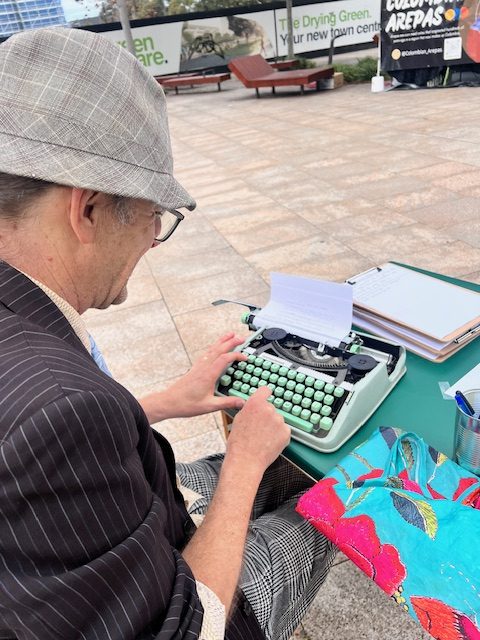What started as volunteering at a writer’s workshop ended up helping me realise what the most important aspects of writing are. Madison Woods reports.
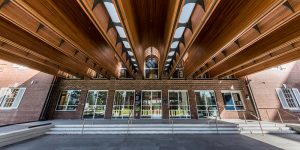
“You alright there?” A man asked from his car. He must have thought he should say something to me by that point. Five minutes had passed, and I was still standing at a locked door, so it made sense why he was calling out to me from the parking lot. I pointed somewhere in a direction I wasn’t paying attention to, trying to play the part of someone who knew where she was going and not a confused American student abroad who had never stepped foot in Green Square beforehand.
“I’m just waiting for someone to open the door. I’m supposed to be volunteering, but the door is locked,” I responded, seeming every bit as lost as I was. I fought the urge to curl into a ball when the man suggested I should try the front door instead. I didn’t mention that I thought I was already at the front door.
The front of 107 Green Square Creative Centre did not have a locked door. Instead, it boasted an open door behind an array of grey beams and a lawn of grass. Whereas I had been holding my breath from a locked door previously, I was now letting out a breath at the architecture, wondering how lucky the people of Zetland felt to live by something that looked so cosy.
Two team members greeted me upon my entrance, leading me to the room the day’s event would take place in. Eventually, we were joined by the presenter of the event, Richard Holt, who introduced himself as we set up the room. Dressed in clashing colours with a fedora and blazer, he apologised for his appearance. He shed the hat and loosened his tie, putting away his Walter Waite persona he uses to get the attention of local community members to share their stories.
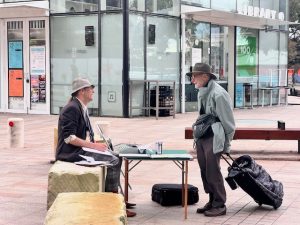
We set up the room for the day’s activities. Named ‘Do Tell Your Story Of Green Square,’ the event was a writer’s workshop where locals of the Green Square area in Zetland could transform stories they would usually tell orally into written form. As we shifted around chairs to accommodate for the influx of people who had signed up for the event that day, Richard relayed his earlier encounters with locals at the Green Square Markets that morning. Dressed in his bold attire, he had invited residents and visitors to share their stories with him. His Walter Waite public performance had encouraged more people than the original number who had initially registered for the event to sign up a few hours beforehand.
The fruits of his labour became apparent when a couple was the first to arrive in the room, describing themselves as having witnessed Richard’s showcase at the market and being interested in the workshop event when hearing about it there. Soon, even more people came trickling in and the day’s workshop began.
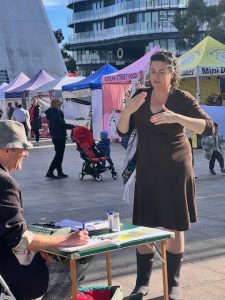
As an intern volunteering for the event, I was tasked with taking photographs and ensuring that participants had what they needed. At my university back home, I was no stranger to discussing writing in person, having taken a creative writing class the semester before I began my study abroad in Sydney, Australia this winter. But while the academic, graded version of the class had been educational and collaborative in its own right, the scene at 107 Green Square had its own unique sense of community.
Richard led the group through the basics of storytelling. As I snapped pictures, an outsider to this local gathering, I was reminded of a university lecture: Richard playing the part of a professor pointing to a projected PowerPoint on the wall, and the participants his pupils, taking notes and staring at his presentation with concentrated eyes. However, that thought was soon forgotten as I saw Richard was not concerned about what was correct to write. He was concerned about if it was what people wanted to write.
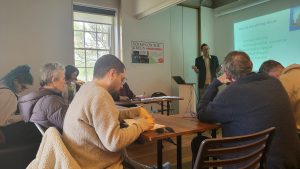
The first pause in the presentation was when it was decided that pair work was in order. The group of ten were split into five pairs, either turning to the person they walked into the room with or to someone they had met half an hour ago. Despite the initial unfamiliarity with each other, all of the pairs easily slid into friendly chatter like they had known each other weeks beforehand.
The assignment was simple enough, the groups were to come up with stories about Green Square. Despite the broad and unassuming prompts, all of the pairs produced gems for stories, such as: a story about someone moving to Green Square and finding a new connection with an eventual housemate after losing their former apartment, and two different tales about the divide between the less well-off and wealthy populations.
While these stories were mainly based in fiction, with Green Square being the only nonfictional part of them, they helped me understand the community I was volunteering for. I had walked into the town noting the nice weather, not even aware of the community or issues that they may have faced. These stories helped me understand the area more than any book or website could, those second-hand stories from biographies and device screens lacking the personal aspect of the story process in real time.
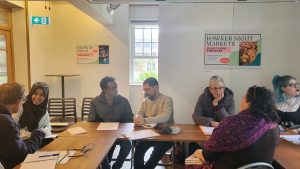
After being warmed-up by creating group stories, the workshop moved onto solo storytelling. A much quieter tone hung over the room for ten minutes, but everyone’s pens and pencils were moving just as urgently as they did during partner work. Even I put pen to paper and began to draft a story, certainly silly and even more certainly not something I would have written in an academic setting. However, hearing Richard encourage us to just write because there is no such thing as “bad writing” made me get past that block of worrying if what I was writing was ‘good enough’ so I could just write.
Besides, Richard is right; there is no such thing as bad writing. There’s only what someone personally is interested in, and what they are not. Certainly, nothing that was shared after the solo writing session was over could be close to being considered ‘bad.’ The stories ranged across a wide variety, such as a work about one of the participants looking to improve themself as a writer and coming across Richard’s workshop. There was a story by someone describing their hectic journey to get to the workshop where they were eventually greeted by a “woman in a green jumper” who suspiciously sounded like me. Despite the writers being in the same place and having the same amount of time to write, everyone’s voice and style was unique. Yet they all had one thing in common: you could tell they were having fun through the way their writing sounded.
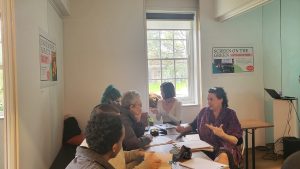
Eventually, the workshop was over and everyone cleared out after the two-hour program. All that was left behind were papers and writing implements. But, looking back on when I stepped out of the Creative Centre at 107 Green Square, through the correct entrance this time, I can’t help but think I left something behind there. Maybe it was just my fear of writing nothing but perfection. I don’t think I’ll need to go back for it.
About the author:
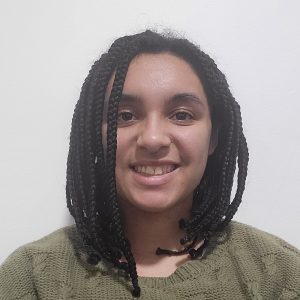
Madison Woods is a third-year university student studying English at Boston University in the United States. Currently, she is studying abroad in Sydney for the winter while interning for Spineless Wonders. In her free time, you can find her baking a cake or binge reading the next book on her to-be-read list.
Photo credits: Madison Woods, Zoe Hercus and 107 Projects

